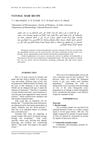 17 citations,
April 2021 in “Molecules/Molecules online/Molecules annual”
17 citations,
April 2021 in “Molecules/Molecules online/Molecules annual” Linoleic acid from Malva verticillata seeds may help treat hair loss by promoting hair cell growth and blocking baldness signals.
 15 citations,
February 2014 in “BMC Research Notes”
15 citations,
February 2014 in “BMC Research Notes” The X5 Hairlaser might help treat male hair loss, but more research is needed.
 2 citations,
January 2019 in “International Journal of Case Reports and Images”
2 citations,
January 2019 in “International Journal of Case Reports and Images” The hair growth solution reduced hair loss and increased hair thickness in a small group of patients.
 2 citations,
January 2017 in “Clinical and medical investigations”
2 citations,
January 2017 in “Clinical and medical investigations” Herbal lotions are effective for severe hair loss, with a 64.8% success rate, but relapse is common and long-term management requires allergen control and possible corticosteroid use.
 2 citations,
December 2004 in “Medicine”
2 citations,
December 2004 in “Medicine” Different hair and scalp disorders cause hair loss or excess hair growth, with various treatments available depending on the specific condition.
 1 citations,
April 2023 in “Biomolecules”
1 citations,
April 2023 in “Biomolecules” Fermented papaya and mangosteen in hair care products helped prevent hair loss and improve hair thickness.
February 2024 in “Cosmetics” The conclusion is that new plant-based treatments for hair loss may work by targeting certain enzymes.
 January 2024 in “International journal of homoeopathic sciences”
January 2024 in “International journal of homoeopathic sciences” Homeopathic treatments can effectively manage hair loss and improve well-being.

Different genes cause Female Pattern Hair Loss compared to male hair loss, and treatments vary, but more research is needed to understand it fully.
 July 2018 in “Elsevier eBooks”
July 2018 in “Elsevier eBooks” Some drugs can cause reversible hair loss, but certain chemotherapy drugs may lead to permanent hair loss; drugs can also change hair color and texture.
 August 2016 in “Journal of Investigative Dermatology”
August 2016 in “Journal of Investigative Dermatology” Some men don't respond to common hair loss treatments, but a new inhibitor, FOL-005, shows promise for targeting unwanted hair growth.
 June 2004 in “Bulletin of Pharmaceutical Sciences. Assiut University”
June 2004 in “Bulletin of Pharmaceutical Sciences. Assiut University” The natural hair treatment with Cantharidin works best for hair loss.
January 2020 in “Advances in Sexual Medicine” Female pattern hair loss does not significantly affect sexual dysfunction.
October 2019 in “International Journal of Research in Dermatology” Combining minoxidil and spironolactone is more effective for female hair loss, but minoxidil alone is sufficient after 6 months.
 416 citations,
September 1997 in “Journal of Investigative Dermatology”
416 citations,
September 1997 in “Journal of Investigative Dermatology” People with hair loss have more androgen receptors and enzymes in certain follicles, with men and women showing different patterns.
 108 citations,
July 2004 in “American Journal of Pathology”
108 citations,
July 2004 in “American Journal of Pathology” Stress increases a factor in mice that leads to hair loss, and blocking this factor may prevent it.
 37 citations,
March 2014 in “Journal of Trace Elements in Medicine and Biology”
37 citations,
March 2014 in “Journal of Trace Elements in Medicine and Biology” Lower hair zinc and copper levels found in Turkish males with hair loss; higher BMI linked to less hair zinc.
 31 citations,
January 2003 in “Dermatology”
31 citations,
January 2003 in “Dermatology” Steroidogenic isoenzymes may help improve treatments for common hair loss.
 28 citations,
March 2016 in “Toxicologic pathology”
28 citations,
March 2016 in “Toxicologic pathology” Dogs could be good models for studying human hair growth and hair loss.
 24 citations,
January 2015 in “Annals of Dermatology”
24 citations,
January 2015 in “Annals of Dermatology” Herbal extracts may help hair grow and could be an alternative to synthetic hair loss treatments.
23 citations,
January 2016 in “International Journal of Trichology” Women with female pattern hair loss have lower Vitamin D3 levels.
 19 citations,
January 1997 in “Dermatologic Clinics”
19 citations,
January 1997 in “Dermatologic Clinics” Most treatments for hair loss in 1997 were not effective for most people, and maintaining hair growth was difficult.
 19 citations,
October 1996 in “Dermatologic Clinics”
19 citations,
October 1996 in “Dermatologic Clinics” Dermal papilla cells are key for hair growth and could help us understand and treat hair loss.
 13 citations,
January 2014 in “PubMed”
13 citations,
January 2014 in “PubMed” Adiantum capillus-veneris Linn reduced hair loss and improved hair growth in mice with testosterone-induced alopecia.
 11 citations,
January 2001 in “Cambridge University Press eBooks”
11 citations,
January 2001 in “Cambridge University Press eBooks” Androgens can cause hair growth in some areas but hair loss on the scalp.
 7 citations,
January 2010 in “Pharmacognosy Research”
7 citations,
January 2010 in “Pharmacognosy Research” The tobacco leaf extract may help hair grow and could treat hair loss.
5 citations,
August 2019 in “Anais Brasileiros De Dermatologia”  5 citations,
January 2013 in “Journal of Cosmetics, Dermatological Sciences and Applications”
5 citations,
January 2013 in “Journal of Cosmetics, Dermatological Sciences and Applications” New treatments for hair loss are promising.
 4 citations,
August 2020 in “Journal of Cosmetic Dermatology”
4 citations,
August 2020 in “Journal of Cosmetic Dermatology” QR 678 and QR678 Neo treatments are effective for hair loss in women with PCOS.
 1 citations,
January 2017 in “International Journal of Trichology”
1 citations,
January 2017 in “International Journal of Trichology” Psychological stress and personal history are significant factors in hair loss.

























